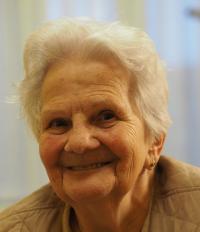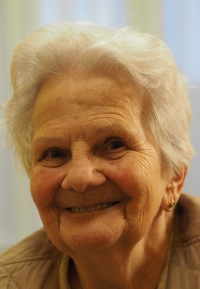I will never forget how the Americans brought my father on a jeep

Stáhnout obrázek
Marie Švecová was born on 7 September 1932. She never knew her biological parents. She was adopted by Mr. and Ms. Marek when only few months old. She grew up in Roudnice nad Labem and later in Prague - Nusle. Her adoptive father, the Russian legionary Josef Marek, was arrested in 1942 by Gestapo and he spent the rest of the war in the concentration camp Flossenbürg. Until May 1945, Marie Švecová lived only with her adoptive mother Anna Marková. In 1946, she welcomed Josip Tito in Prague. In 1948 she took part in the XI. All-Sokol Festival. In 1954, she completed post-secondary studies in construction projects, and soon entered the State Project Institute, where she worked until her retirement. In 2020, Marie Švecová lived in Strašnice, Prague.

